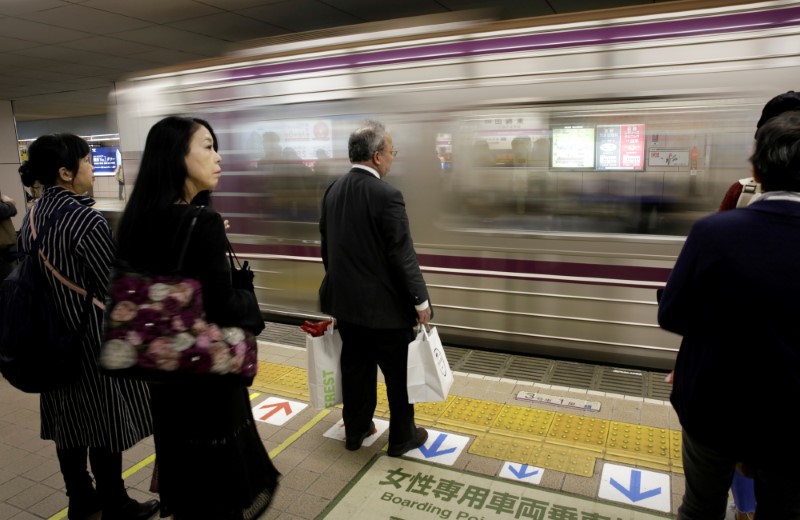 © Reuters. FILE PHOTO: Commuters wait for a train in Osaka
© Reuters. FILE PHOTO: Commuters wait for a train in OsakaBy Tetsushi Kajimoto
TOKYO (Reuters) – Japanese workers’ inflation-adjusted real wages rose for the first time in four months in March, government data showed, in a sign of a gradual increase in salaries that should help stimulate consumer spending.
The data will be encouraging to the Bank of Japan as it struggles to accelerate inflation to its 2 percent target with sluggish wages keeping a lid on consumer spending. Many market players see the central bank in no rush to unwind its massive monetary stimulus.
Despite more than five years of aggressive monetary easing, inflation remains subdued with firms wary of sharing their record profits with workers, prompting the BOJ to drop the timeframe for hitting its 2 percent inflation goal.
Labor ministry data out on Wednesday showed real wages rose 0.8 percent in March from a year earlier, snapping back from a revised 0.8 percent annual decline in the previous month.
“The tight labor market is now creating noticeable cost pressures,” said Marcel Thieliant, senior Japan economist at Capital Economics. However, “the upshot is that policy tightening remains a distant prospect.”
Thieliant estimates the jobless rate would have to fall to around 1.5 percent from the current 2.5 percent in order to see wage growth reaching levels consistent with hitting the BOJ’s 2 percent inflation goal.
The job market may not tighten further as a planned sales tax hike to 10 percent from the current 8 percent in October 2019 could dampen domestic demand, he added.
A slowdown in inflation, rises in regular pay and one-off bonus payment, and a decline in the share of low-paid part-timers led to the rebound in real wages in March, the ministry said.
The trend “remains unchanged that nominal wages are rising gradually,” a ministry official said.
Nominal cash earnings rose 2.1 percent year-on-year in March, the fastest annual gain since June 2003. It followed a revised 1.0 percent gain in February.
Regular pay, which accounts for the bulk of monthly wages, grew 1.3 percent in the year to March, the biggest gain since July 1997, while special payments jumped 12.8 percent as many firms offered their employees end-of-the-year bonuses.
Overtime pay, a barometer of strength in corporate activity, rose an annual 1.8 percent in March versus a revised 0.4 percent increase in February.
Major Japanese firms, which typically increase wages in unison after spring negotiations with unions, have agreed to hike wages for a fifth year in the fiscal year that started on April 1.
Still, many firms have resisted Prime Minister Shinzo Abe’s call for raising pay by 3 percent or more.
Fusion Media or anyone involved with Fusion Media will not accept any liability for loss or damage as a result of reliance on the information including data, quotes, charts and buy/sell signals contained within this website. Please be fully informed regarding the risks and costs associated with trading the financial markets, it is one of the riskiest investment forms possible.
Source: Investing.com




























